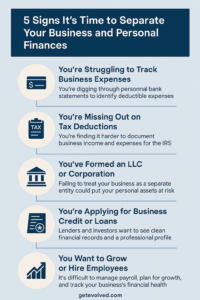If you’re running a small business or side hustle, it might feel convenient to use your personal bank account for everything. But as your business grows, that blurred line can lead to serious financial, legal, and tax headaches. In fact, failing to separate business and personal finances is one of the most common mistakes entrepreneurs make—and one that can cost you in more ways than one.
Here are five clear signs it’s time to draw the line and treat your business like the separate financial entity it is.
1. You’re Struggling to Track Business Expenses
If you’re digging through personal credit card statements to find deductible expenses or manually separating receipts at tax time, it’s a red flag. Without a dedicated business checking account or business credit card, your bookkeeping becomes a mess and your accountant’s nightmare.
According to the U.S. Small Business Administration, opening a business bank account is one of the first and most important steps in establishing financial clarity. It simplifies accounting, improves cash flow visibility, and ensures you’re ready for tax season.
2. You’re Missing Out on Tax Deductions
Mixing personal and business finances can lead to missed deductions or worse; IRS scrutiny. The IRS requires clear documentation of business income and expenses, and co-mingled accounts make it harder to prove what’s deductible.
Separating finances not only streamlines tax filing but also protects your personal assets in case of an audit or legal dispute.
3. You’ve Formed an LLC or Corporation
If you’ve taken the step to legally incorporate your business, whether as an LLC, S-Corp, or C-Corp, you’re required to treat it as a separate legal entity. That means separate bank accounts, credit lines, and financial records.
Failing to do so can result in “piercing the corporate veil,” which puts your personal assets at risk in the event of a lawsuit or debt collection. SCORE emphasizes that maintaining this separation is essential for legal protection and credibility with lenders.
4. You’re Applying for Business Credit or Loans
Lenders and investors want to see clean, professional financial records. If your business finances are tangled with personal spending, it’s harder to demonstrate profitability, creditworthiness, or even basic cash flow.
Establishing a business credit profile can help you qualify for better financing terms and build long-term credibility. The SBA recommends applying for credit in your company’s name to build a separate financial identity.
5. You Want to Grow or Hire Employees
Growth brings complexity. Whether you’re hiring your first employee, expanding to new markets, or investing in equipment, you need a clear picture of your business’s financial health. That’s nearly impossible if your finances are co-mingled.
A separate business account allows you to manage payroll, track expenses, and plan for growth with confidence. It also signals professionalism to vendors, partners, and customers.
It’s Never Too Late to Separate
Even if you’ve been mixing finances for years, it’s not too late to fix it. Start by opening a business bank account, applying for a business credit card, and using accounting software to track income and expenses. Consult a CPA or financial advisor to help you clean up past records and set up a system that supports your goals.
For a step-by-step guide, check out the SBA’s Official blog on separating business and personal finances.




